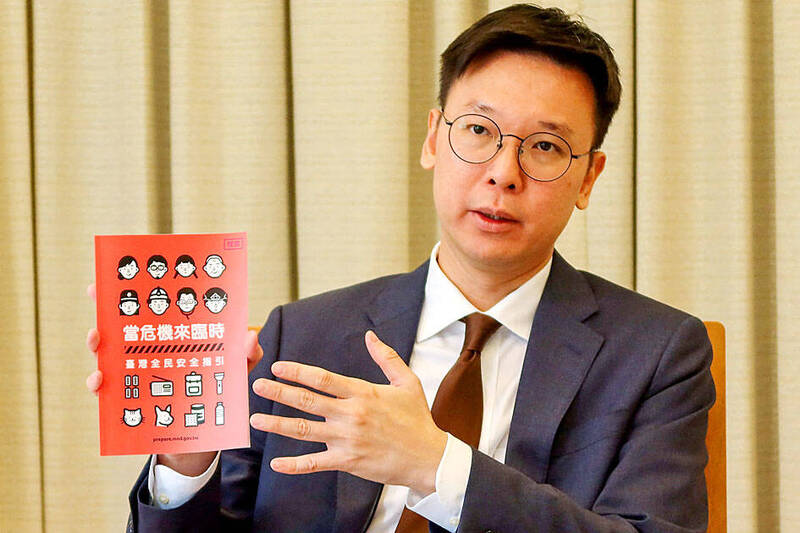Politics
Taiwan Issues New Security Guidelines Amid Rising China Threat

Taiwan is set to release updated security guidelines next week in a new civil defense handbook aimed at preparing citizens for potential emergencies, particularly in light of increasing military pressure from China. For the first time, the handbook will instruct the public on actions to take upon encountering enemy soldiers and clarify that any claims of Taiwan’s surrender should be deemed false.
The bright red-orange handbook, accessible to individuals of all ages, features cartoon characters that represent Taiwan’s diverse population on its cover and throughout its 29 pages. It emphasizes the importance of community resilience with the message to “protect each other and safeguard our beloved home.”
In a statement, National Security Council Deputy Secretary-General Lin Fei-fan noted that Taiwan has drawn inspiration from similar survival guides developed by other democracies. He highlighted the pressing nature of China’s authoritarian ambitions and referenced Russia’s invasion of Ukraine as a factor that has intensified these preparations. “The global situation — whether in Europe or the Indo-Pacific region — is not a distant concern. It is right at our doorstep,” Lin said.
Comprehensive Emergency Preparedness
The handbook includes a variety of scenarios that Taiwan may encounter, such as sabotage of undersea cables, cyberattacks, and inspections of Taiwanese vessels by hostile forces. It details responses to potential threats, from minor incidents to an all-out invasion. The handbook warns of ongoing misinformation campaigns aimed at undermining Taiwan’s resolve, stating that “hostile foreign forces” might use deepfake technology and local collaborators to spread false narratives.
In the event of a military invasion, the handbook advises citizens to evacuate the area or find shelter away from windows. It cautions against sharing photos or videos that could compromise military positions, as emphasized by All-out Defense Mobilization Agency Director Shen Wei-chih. “That could compromise military movements, which is detrimental to our defensive operations,” he stated.
Addressing Modern Threats
The guidelines also outline potential security risks linked to technology products from China, such as cameras and applications, including DeepSeek, an artificial intelligence tool, as well as popular social media platforms WeChat and TikTok. The handbook warns that these devices could potentially be exploited by adversaries during a crisis.
In addition to practical advice for emergency situations, the handbook provides tips for parents on how to discuss potential crises with their children. Lin emphasized that the aim is not to instill fear, but to equip families with effective coping strategies. “Many parents actually don’t know how to discuss a potential crisis with their children,” he explained.
As Taiwan prepares to implement these new guidelines, the emphasis is clear: readiness and resilience in the face of uncertainty are crucial for the nation’s defense. The updated handbook, originally published in 2022, serves as a vital resource for the Taiwanese people, reinforcing the commitment to national security and community support.
-

 Business5 months ago
Business5 months agoKenvue Dismisses CEO Thibaut Mongon as Strategic Review Advances
-

 Lifestyle4 months ago
Lifestyle4 months agoHumanism Camp Engages 250 Youths in Summer Fest 2025
-

 Sports4 months ago
Sports4 months agoDe Minaur Triumphs at Washington Open After Thrilling Comeback
-

 Sports5 months ago
Sports5 months agoTupou and Daugunu Join First Nations Squad for Lions Clash
-

 Top Stories5 months ago
Top Stories5 months agoColombian Senator Miguel Uribe Shows Signs of Recovery After Attack
-

 World5 months ago
World5 months agoASEAN Gears Up for Historic Joint Meeting of Foreign and Economic Ministers
-

 Health4 months ago
Health4 months agoNew Study Challenges Assumptions About Aging and Inflammation
-

 Business5 months ago
Business5 months agoOil Prices Surge Following New EU Sanctions on Russia
-

 Entertainment4 months ago
Entertainment4 months agoDetaşe-Sabah Violin Ensemble Captivates at Gabala Music Festival
-

 Entertainment4 months ago
Entertainment4 months agoBaku Metro Extends Hours for Justin Timberlake Concert
-

 Top Stories5 months ago
Top Stories5 months agoRethinking Singapore’s F&B Regulations Amid Business Closures
-

 Business5 months ago
Business5 months agoU.S. House Approves Stablecoin Bill, Sends to Trump for Signature









